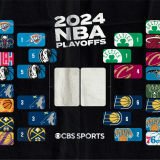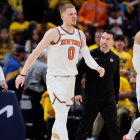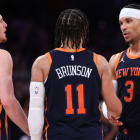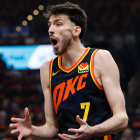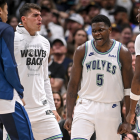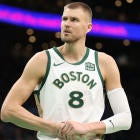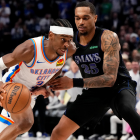OAKLAND-- LeBron James called Game 1 of the 2017 NBA Finals a "feel-out" affair on Saturday, which must have felt pretty rough as they were blasted 113-91 and posted a sub-90 offensive rating. It was a dominant performance from the Warriors, but also a pretty terrible one from the Cavs. Turnovers, 20 to be exact, confusion defensively -- especially in transition as Kevin Durant traipsed in for dunk after dunk -- and a lack of what Richard Jefferson called "hunger" put the Cavaliers down by 20 and eventually in a 1-0 deficit.
So now comes the difficult test of theory in Game 2. The Cavaliers' mood on Saturday was one of zero panic or frustration. They felt they played poorly. Tristan Thompson called his game "trash." Kyrie Irving said the team just had to "settle in." On and on, the Cavaliers listed off ways that they simply played badly in Game 1. The other side of that is from the media, who entered with concerns over whether the Cavs could really match up with Golden State and left Game 1 convinced this series may be shorter than everyone expected.
That reaction is predictable, playoff games -- Finals games in particular -- tend to be that way, swinging wildly from contest to contest based on the result. But there was a lot hidden away in Game 1 that foretold doom for the Cavaliers beyond those turnovers and their poor play.
- Jefferson noted that the Warriors, despite all those run-out dunks, shot 42 percent from the field. He noted that Klay Thompson would likely make more shots, but the overall sense was that the Cavs did some good things. But the other side of that, naturally, is that the Warriors crushed the Cavs, and the Warriors didn't even shoot well.
- The Cavs are maintaining that they want to play fast, and that's a tricky subject we explored here. If they're wrong on that gamble, they may not be able to realize it until it's too late.
- The Cavs talked a lot about wanting to "hit first" in a battle of physicality, but that, like the pace issue, may be based on prior evaluations of their opponent. Durant is slim, but aggressive. David West and Zaza Pachulia are not to be trifled with. JaVale McGee's raw size dictates a level of physicality. And that's without pointing out that the Warriors themselves have toughened up over the years. Three straight Finals appearances will do that to you.
- Turnovers were the biggest talking point, and to be sure, the Cavs won't turn the ball over 20 times. But the Warriors have a host of ways to create those turnovers. Thompson was sniping LeBron's jump-pass to the corner off the drive; that's a staple of his offense that most opponents can't anticipate correctly. Andre Iguodala drew charges on James; most players don't have the reputation with the officials to draw that call. There's just a high level of both experience and ability drawn by their length with the addition of Durant.
This is the biggest key: the Warriors are not the same team. Maybe the Cavs know this, and their execution of the game plan simply evaporated in a series of missed layups and badly thrown passes in Game 1. But there is ample talk from them to suggest a sense of "Well, we beat them last year."
But that's not correct. The Cavaliers did not beat this team last year. They beat a worn-down, beat-up, exhausted version of this team that a. did not have Kevin Durant b. did not have a healthy Stephen Curry (though no one's healthy in the playoffs) and c. did not have their starting center. All three of those things are different now.
The same is true for the Warriors, who haven't faced a Kevin Love playing this well or this confident. In reality, Love was the only Cleveland player who really played great in Game 1. Outside of his early post-up struggle with Thompson against the clock and a few issues guarding Curry and Durant on switches aside -- and no one's guarding those guys effectively anyway -- Love was good. But Love was also inconsequentially good in Game 1, vs. the Warriors, who were consequentially great.
The Cavaliers' gamble right now is that they can play their way, the way they did last year, and be successful. It's hard for a champion to see the world any other way.
But Game 2 stands as a test of that theory. If the Cavaliers don't have as many simple mistakes and still get blown out, it's not realistic to believe it's just "playing better." There's a middle ground, where they make some adjustments to how this Warriors team is different (and stopping the ball first instead of floating to the perimeter shooters on the break is a great, simple example Tyronn Lue mentioned) and simply play better. But if that doesn't work, then there's going to be a lot of concern for the Cavs headed back to Cleveland down 0-2.
Some final thoughts on what the Cavs need to do:
- Multiple Cavs players mentioned how the Warriors are sending two or three guys to block out Thompson on rebounds, but as we covered here, part of that was connected to how quickly Irving was shooting coming off the pick and roll, giving Thompson no time to get into position. The Warriors are also spreading Thompson out both on switches and when he's guarding Draymond Green. Jefferson said Saturday that part of that is the Cavs' assignment for him, based on their confidence in him to contain those players on the outside. And that's great, but the further Thompson is away from the basket, the less he can help contain players who are driving, or helping with the rebound. Thompson drew the assignment on Green regularly in Game 1, despite the Warriors not going to their smallball unit that much. That may need to change in Game 2.
- Irving has to play better, but that's a misnomer. This is the problem with Irving's game, or at least with evaluating it. Irving takes contested, rushed shots, often in one-on-one situations. Trying to judge whether he made the right or wrong decision is largely impossible. If he makes the shot, it's a great decision, if he misses, it's a bad one. Irving can play more in the flow, and defensively, he was a wreck in terms of both his instincts and communication in Game 1, but so much of it just comes down to whether or not he's making shots. He has to play better, which means he has to make more shots.
- The Warriors held the Cavs to 15 of 35 (43 percent) shooting inside five feet in Game 1. On one level, you can say "you're not going to be successful trying to score on the Warriors' excellent interior defenders." But many of the shots were good shots. They're contested, but they are shots Love or James can make, even over those defenders, and they didn't. They're going to need those shots to go their way, and more importantly, they have to keep taking them in Game 2.
One final thing. LeBron's tone has been different in these Finals for a lot of reasons. He's had to deal with the vandalism of his Brentwood home to start the series, and his press conference revealed the weight that incident put on him not only personally, but by creating stress over how to react to it with his family. The incident involving a racial slur graffitied at his home didn't impact him in Game 1, he was still LeBron James, and those turnovers were not the product of that distraction, to any discernible level. I mention that incident only to put his mood and tone in context.
James chose to speak at one of the smaller podiums rather than the press conference on Saturday. And his tone has been one of absolutes. He knows where he stands in terms of history, he's not trying to prove anyone wrong. But there's also a lot of parallels to how he sounds in this series compared to 2014, when the Heat just didn't have enough against the Spurs. The Spurs simply had the better team, and answers on every level, the year after James and the Heat pulled off an epic comeback from down 3-2. James is a relentless competitor and the best player of his generation; he'll give the same effort and output that he brings to every Finals game. With comments like those from Lue about the Warriors being "the best he's ever seen," it's hard to escape a sense of reality that the Cavs may be aware that this Warriors team with Durant may just be too much to handle.
If they take Game 2? All of that goes out of the window. If they lose Game 2, Game 3 becomes high noon, the last stand for these defending champions, essentially, no matter how miraculous last season's comeback was. (Yes, I'll go ahead and jinx this, there's no way the Cavs are coming back from down 3-0.) There's a lot of series left to be played. But in the moment, you do wonder about the battle with James between his confidence and uncompromising competitiveness, and his intelligence in being able to recognize how good these Warriors are.
The playoffs have been short on drama, the Finals started with a sputter. if Game 2 goes the same way, there's going to be an overriding sense that maybe all of this season's competitive outcomes were decided back on July 4, when Durant said yes to the Warriors.











